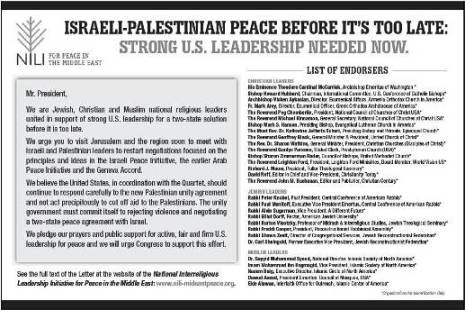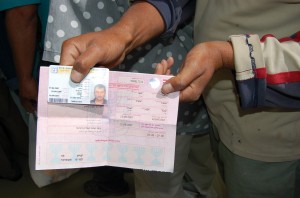Greetings to you this U.S. Memorial Day. In addition to remembering those whose lives have been lost defending the United States, this is an important day to recognize “the things that make for peace” (Luke 19:42). In these days after a series of speeches on the Israeli-Palestinian conflict from both President Obama and Prime Minister Netanyahu, those things again seem hidden from our eyes.

President Obama and Prime Minister Netanyahu
We are in a rapidly changing diplomatic climate. The “Arab Spring” has upset the balance of known relationships in the Middle East. From a “realist” foreign policy perspective, this is a time for reassessing the value of long-standing and emerging allies while measuring known and emerging threats to U.S. economic and national security interests. In such a climate, recognizing and promoting “the things that make for peace” becomes even more challenging.
Every relationship in the region is up for negotiation. This includes the U.S. relationship with the State of Israel and the Palestinian people. Many are questioning the proposition that the only path to peace is through a U.S.-controlled peace process. These questions are beginning to change minds. Why else would Michael Oren, Israel’s ambassador to the United States, publish an article in Foreign Policy calling Israel a “partner par excellence” and arguing that “America needs Israel now more than ever”?
Instead of taking the opportunity to challenge the policies of the State of Israel, the Obama Administration has decided to double down on its traditional, unwavering support. The February U.S. veto of a UN Security Council resolution on Israeli settlements pushed one stack of chips into the center of the table. The recent speeches by President Obama (at the State Department and before the American Israel Public Affairs Committee) offered up another.
But why? Why is this moment in history passing without a significant challenge to the patently illegal practices of the State of Israel in the territories it has occupied since 1967? To answer this question, foreign policy calculations must be taken into account. But that is not sufficient. There is something unique to the Israeli-Palestinian conflict which constrains American foreign policy at this critical juncture: the peace process itself.
The plot is complicated. Luckily, George Mitchell, the Obama Administration’s former U.S. Special Envoy for Middle East Peace, recently provided a “Cliff’s Notes” synopsis of the Obama Administration’s current approach to Israel and Palestine. In his May 26 interview with Charlie Rose, Mitchell provided the key to understanding the logic informing current realities, at least from the U.S. perspective. The upshot: it’s all about Israel.
Mitchell carefully explained that President Obama’s recent speech took place within the context of both the Arab Spring and Palestinian efforts to receive recognition as a state in September through the UN General Assembly. As Mitchell put it bluntly: “President Obama is trying to head off a train wreck at the UN in September.” The rest of the interview makes it clear that the disastrous effects of Palestinian efforts at the UN will be visited not on the Palestinians, but on the United States and the State of Israel.

Graphic: Foreign Policy Magazine
During the interview, Mitchell mentioned three threats to the State of Israel: 1) demographic realities which threaten either the democratic or Jewish nature of the state; 2) rapid developments in weapons technology, especially missiles; and 3) the increasing isolation of the State of Israel on the international scene. He mentions that this international isolation is problematic for the United States as well. Ambassador Oren’s proud claim that Israel is the “ultimate ally” of the United States comes with consequences.
At the same time President Obama enunciates the principles of self-determination for others in the region, the United States is putting its full effort into derailing Palestinian progress toward September. In addition to providing incentives for Palestinians to abandon this path and return to the negotiating table, Mitchell shared that, diplomatically, the administration is seeking to persuade other countries to not support the effort. Because positive recognition through the UN would “only deepen the crisis from Israel’s standpoint,” the Obama Administration’s efforts have “one objective: making it more likely we can get a peace agreement—a meaningful, sustainable peace—than these other actions can ultimately provide.”
And there it is. The potential “train wreck at the UN in September” will be most damaging to Israel, to the United States, and, most fatally, to the “peace process” itself. Nevertheless, the highest goal of the Obama Administration relative to the Israeli-Palestinian conflict appears to be preservation of the process. Only a process managed by the United States, for which Israel claims to be an “ultimate ally,” can sufficiently assuage Israel’s sense of “crisis.”
One can forgive Palestinian leaders for not accepting the premise that such a process will lead to an agreement which honors the best interests of their people. Their incremental move away from this slanted negotiation table toward the broad multilateralism of the United Nations—described by those tending to the peace process as an act of brazen unilateralism—is at least reasonable. As Mitchell said, “Salaam Fayyad is a truly outstanding leader.”
The problem we are facing is a lack of imagination of what comes next, after the current peace process is recognized to have ended. It ended, in fact, with the U.S. veto in February, forcing Palestinians to decisively seek another path. Even if Palestinian efforts toward September are successfully forestalled, what happens after the train wreck finally occurs and the present U.S.-Israeli goals of extending hegemony and projecting power are exposed as irreconcilable with the goal of delivering sustainable peace?
Instead of recognizing the things that make for peace for Israel and Palestine, the United States remains locked in a struggle to preserve its control of a peace process that appears to have run its course. U.S. policy toward the Israeli-Palestinian conflict is caught in a feedback loop, the content of which is less and less convincing to the international community. It is time for the United States to finally recognize “the things that make for peace” in the Israeli-Palestinian conflict and work toward a Palestinian state that is just as viable as any of its neighbors. If U.S. policy is formed by a government of its people, that recognition is up to you.
Rev. Robert O. Smith, Ph.D.
Coordinator, Peace Not Walls initiative of the ELCA






